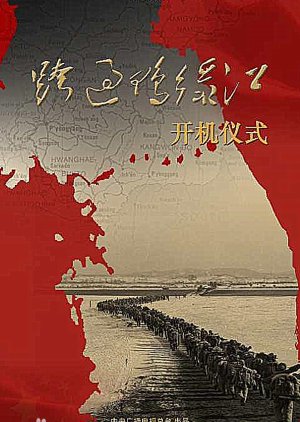U.S. artillery shells landed on the ground, and the flying dust covered Lu Chengfeng and Oliver. The two men were aiming at each other motionlessly on one side, and they spent a day and a night. Lu Chengfeng's eyes were bloodshot, but he still stared at Oliver as long as he shot. Oliver, who had almost collapsed, stood up, Lu Chengfeng also stood up with his gun, and killed him the moment Oliver raised his hand.
Harrison brought a lot of negotiation materials, and Clark only followed the White House's request not to talk about prisoners and told him that politics is far crueler than war. The US insisted that it could only release 83,000 people who had returned voluntarily. This made Nanri angrily patted the table and stood up. Harrison just wanted to take another day off. The number of prisoners of war released by the United States differs greatly between the number of the Korean People’s Army and the Volunteer Army. Mao Zedong keenly knew that this was to instigate the relationship between China and North Korea. He demanded that he would never agree to resolve the negotiation. The more the enemy is. It won't really break.
Nanri proposed that all prisoners of war must be released, but the United States still disagrees. Negotiations are deadlocked again, and for every minute of delay, the soldiers on the front line will sacrifice more. Li Kenong shot out the last bullet of Yang Chunzeng of the 35th Division of the Twelfth Army while garrisoned in the position. The deeds of killing the enemy with the enemy inspired the negotiating comrades. The negotiation is not based on numbers, but on faith and belief. The defense of peace. Mao Zedong's speech at the 38th meeting of the National Political Association deeply inspired every soldier on the Korean battlefield. Deng Hua keenly perceived that the battle would eventually come together and that the U.S. emperor was bullying the soft and fearing the hard. The central government decided to implement the strategic deployment of alternate defenses, and it must be prepared for a protracted war. President Peng forwarded the intercepted telegram to Deng Hua. Clark and Van Fleet came to the Korean battlefield to inspect the US military's defense. It seemed that the US military was about to launch a major move. Deng Hua deployed in time and required all troops to take precautions.
China and North Korea proposed to send prisoners of war from both sides to the demilitarized zone for exchange, and the Red Cross will repatriate them according to their nationality. However, Harrison arrogantly claimed that prisoners of war would be screened. The United States blatantly violated the International Prisoners of War Convention and announced an indefinite adjournment to suspend negotiations. Mao Zedong and Zhou Enlai no longer tolerate the shameless behavior of the United States. Mao Zedong instructed Li Kenong to lead the team to withdraw to the country first.
The volunteers on the Shangganling position shifted to focus on defending the tunnels. The soldiers overcome many problems such as lack of water, food, and air pollution. They guarded the tunnels and organized a small number of corps to attack. The Third Corps sent two divisions to serve as reserve teams, which created favorable conditions for the volunteers to counterattack. Li Kenong is about to return to China. Before leaving, he made two suggestions to the comrades of the negotiating team. One is to safeguard the interests of the motherland without compromise, and the other is to maintain justice and strive for peace.
The Volunteers have grasped the time to start the war, and they can control the war situation. At night, while the U.S. troops were resting, the Volunteer soldiers launched a counterattack. Of the 23 positions, 21 positions had been conquered, and 16 positions were completely wiped out. The soldiers used the method of ambushing near the enemy day and night in advance, waiting for the opportunity to launch a surprise attack, which is a great test of the soldiers' willpower.
By the small river outside the enemy's position, a group of volunteer soldiers crawled silently and kept their camouflage. Hungry and thirsty, they could only quietly pull up the weeds around them to satisfy their hunger. The sudden attacks by the volunteers over the past few days have caused the enemy to be frightened. They ordered a few shells to be fired into the grass on the opposite side. The raging flames burned the grass. Qiu Shaoyun, a soldier of the Ninth Company of the 87th Regiment of the 29th Division of the 15th Army, in order to complete the dormant The mission is to endure the pain without moving when the fire burns, and sacrifices heroically. He was only twenty-six years old.
At night, the soldiers shouted for revenge for Comrade Qiu Shaoyun and rushed to the enemy's position. The anger of losing their comrades and the determination to defend the country made these people invincible steel soldiers. President Peng received Qiu Shaoyun’s sacrificed merit assessment materials, and the 87th regiment asked him to rate the third-class merit, but Deng Hua and others agreed that he should be evaluated first-class merit. But some people feel that according to the relevant provisions, Comrade Qiu Shaoyun did not shoot on the battlefield and could only be rated as third-class merit. President Peng carefully read Qiu Shaoyun's information, and he excitedly said that he is a role model for the volunteer army, and such a hero must be remembered. He took out his pen to write down the special merits by himself. First-level merits are far from enough to compare with the pain Qiu Shaoyun endured. This is the soul of the Chinese army that can win all battles, and it is also the spiritual wealth that Chinese soldiers can never lose.
Since the beginning of the negotiations, Van Fleet’s combat plan has been almost completely rejected by Li Qiwei, but Van Fleet still insists that after the suspension of the negotiations, the Chinese army launched a series of offensives. They should teach the Chinese army a lesson and actively take counterattacks. . The US military wants to occupy Shangganling, so that it can force the Chinese army to retreat one kilometer. Van Fleet even stated that it only takes two battalions to complete this task within five days, and the number of casualties will not exceed two thousand. The UN General Assembly is about to begin, and the victory on the Korean battlefield is also what the US government expects. He called this action a showdown.

